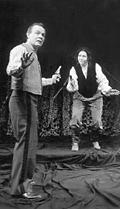SEEING AS DARWIN’S Origins of the Species was published in 1859, none of us should be exceptionally surprised that, biologically speaking, there are but a few DNA strands of difference between humans and chimps. But how little separates us from beasts is still disturbing, almost on a primal level, and this unease is at the heart of H.G. Wells’ 1896 novel The Island of Doctor Moreau. In that prescient early work of science fiction, Wells imagined a scientist obsessed with how to transform a collection of animals, from apes to dogs to big cats, into humanoids through some rather messy surgery.
Moreau
Taproot Theater till March 4
Playwright Sean Gaffney is not the first person to point out the similarities between Wells’ science fiction and today’s scientific fact, with genetic engineers poised to perform the “miracles” that Moreau accomplished through his arcane surgeries. But unlike such disastrous attempts as the recent David Thewlis/Marlon Brando film, Moreau is content to let us draw such conclusions ourselves, keeping the story firmly in the Victorian era.
Gaffney’s inventive dramatization takes a while to get going. For the first 15 or 20 minutes the story is rushed and difficult to follow, as young biologist Prendick (Joshua Bott, in an exceptionally solid and measured performance) is caught in a series of unlikely catastrophes, including escaping cannibalism thanks to both his shipmates falling overboard. Once he makes landfall on the island of the nefarious doctor, however, the piece starts to cohere, and the mixture of philosophical debate and old-fashioned chiller is for the most part surprisingly effective. Nolan Palmer has an impressively villainous swagger as the megalomaniac Moreau, Catherine Gaffney is truly touching as the ape-woman Eden, and, in a major addition to Wells’ original, Alyson Scadron-Wattles has an appropriate felinity as the treacherous Kate, a former puma and later femme fatale. While the assorted denizens of Moreau’s island are convincingly inhuman, it would have been pleasant to have more obvious differentiations between the various “subspecies” in movement and costume.
Wells the Victorian atheist and Gaffney the contemporary Christian have clear differences in their philosophical backgrounds, but the playwright wisely sees that the dilemmas of the original novel have no easy answers. As a result, there’s a surprising amount of common ground in the ethical questions they raise, questions exceedingly relevant to our own age of cloning and gene-splicing. Scott Nolte’s direction generally escapes the dangers of making the philosophy static or the unlikely nature of the drama unintentionally funny, and the evening has some truly creepy moments. Deeply thoughtful with some exotic dressing, this is quite unlike Taproot’s normal material, but this graft of thinker and thriller is a success.








